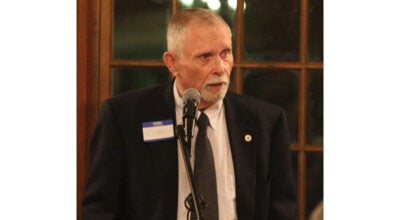The power of the broken road
Published 9:58 am Monday, March 27, 2017
by Andrew Book
One of the most beautiful ways that we encounter God when we gather together (whether it is a group of 2, 200, or more), is to hear the stories of how God has been at work in the lives of the people around us. Often, in church, we call these stories “testimonies,” but that is really just a fancy word for “Stories where God shows up.”
We need those God-stories as people of faith because they point us toward the presence of God in our world. Those stories remind us that, even if we cannot see God in our own lives at that moment (and honest people of faith all have times like that), God is at work and moving in this world. Those stories are our stories as a people of faith because when God shows up in this world, God’s presence is a sign for all of us that we are loved and embraced by a God who comes near, but as much as those stories are our stories, each of us has a very real need to see God in our own lives.
The “best” stories about God always seem to have some element of serious life disaster, which happens before we can see God in the story. The God-stories begin when someone has a horrific accident, gets caught in the snare of substance abuse, or embraces the love of money and the pursuit of pleasure.
I have always been a bit perplexed why God seems to be more powerfully present to people who are in the midst of chaos and brokenness, but I have talked with enough people and heard enough God-stories to know that the other side of brokenness seems to be a very good place to find God.
The book of Psalms agrees with my assessment. In psalm after psalm we see a pattern established: we think we have everything under control and have life figured out, then Something Happens. Whatever that Something is, it throws us out of our comfort zone and shakes us to our very core. In that place of brokenness, we are able to seek God and see God afresh. God loves to show up after Something Happens and when God shows up, we see everything differently. Look at Psalm 30 as an example:
6 When I was prosperous, I said,
“Nothing can stop me now!”
7 Your favor, O Lord, made me as secure as a mountain. Then you turned away from me, and I was shattered.
8 I cried out to you, O Lord.
I begged the Lord for mercy, saying, 9 “What will you gain if I die, if I sink into the grave?
Can my dust praise you? Can it tell of your faithfulness?
10 Hear me, Lord, and have mercy on me.
Help me, O Lord.”
11 You have turned my mourning into joyful dancing.
You have taken away my clothes of mourning and clothed me with joy,
12 that I might sing praises to you and not be silent. O Lord my God, I will give you thanks forever!
There is something about being broken that allows God to infiltrate a life. Writer Jonathan Martin refers to these times as “shipwrecks,” and he writes this:
“While I would not recommend a shipwreck to anyone, any more than I would recommend cancer, car accidents or the plague, I can yet attest to a mysterious truth I have since heard over and over from people who have survived their own shipwrecks: On the other side of them, there is a stronger, deeper, richer, more integrated life. That on the other side of the storm that tears you to pieces is a capacity to love without doubt, to live without fear, to be something infinitely more powerful than the man or woman you were before it happened.
Almost nobody who survives a shipwreck would ever sign up to do it all over again, a second time. Nobody can exactly say they were glad it happened. And yet repeatedly, I hear people say the same remarkable thing — that they also under no circumstances would choose to go back and be the person they were before.” (How to Survive a Shipwreck, 34)
So, for those of you who are broken, take heart, you are closer to God than you may know. You may discover that what has actually broken is the shell which has kept God out and your brokenness is what will actually lead to your salvation! For those of you who are not yet broken, Martin shares these words from Thomas Merton:
“If I had a message to my contemporaries it is surely this: Be anything you like, be madmen, drunks …of every shape and form, but at all costs avoid one thing: success … If you are too obsessed with success, you will forget to live. If you have learned only how to be a success, your life has probably been wasted.” (84)
When we live with the pursuit of success, we place ourselves firmly in the spot of the psalmist in Psalm 30:6, declaring, “I am prosperous, nothing can stop me now!” That sets us up to fall and be broken. Only one thing worse than being broken when you are “succeeding” — not being broken, continuing to succeed, and failing to ever develop the cracks to truly let God into your life. Instead, seek out those who are broken. Walk with them, cook them a meal, wash some dirty laundry for them, and discover that God is truly present with the broken. God is with us all as we embrace those who are broken.
The Lord is close to the brokenhearted; he rescues those whose spirits are crushed. – Psalm 34:1
ANDREW BOOK is the pastor of Courtland United Methodist Church. He can be contacted at 653-2240 or andrew@courtlandumcva.org.





